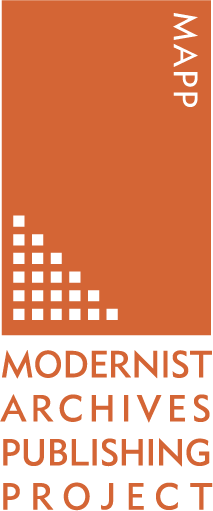We’ve had a busy past few months here at MAPP attending conferences and workshops on both sides of the Atlantic. I’ll do a quick round-up here of the papers we’ve given and the discussions we’ve enjoyed at each of these events.
Our first Spring conference was a poster presentation by Elizabeth at the Digital Diversity conference in Edmonton, Alberta. The conference was held in celebration of 20 years of The Orlando Project, and it is always a pleasure and a privilege to learn from the extensive experience that the Orlando team has to share with the DH and feminist scholarly communities. Our own aim at the conference was to learn from and talk with some of the more established projects on the scene but also to introduce our project to this audience. Our poster therefore gives a bit of a sense of what we’ve been up to and what users of our site can expect to be able to access once we open up some of the archival documents to the public.
Next up, in early June, was the “Modernism and Collaboration” conference at Franklin University in Switzerland. I co-organized that event with a former colleague who now works at Franklin, Dr. Alexandra Peat. The full programme is available here and the weekend was tremendously rich: papers explored the ways in which the modernists themselves collaborated across a variety of art forms (from Dada to dancing, as Alex liked to say!), and also the ways in which modernist scholars are themselves collaborating (embodied in an excellent joint paper by Sarah Davison and Chrissie Van Mierlo). Our keynote speaker for the conference was Andrew Thacker, whose wonderful talk on modernist bookshops made us all even more excited about his emerging project. The relationships between publishing houses and booksellers were of course hugely important to both sides, and Andrew’s work will dovetail interestingly with MAPP as both projects develop. One particularly interesting element of cross-over was a document Andrew showed from Shakespeare & Co. that tracked the purchase history of Ulysses. The document's structure and contents closely resembled the data we’ve found and are digitising in the Hogarth Press Order Books.
While I was in Lugano at the Franklin conference, Alice, Nicola, Elizabeth, and Helen were at the International Virginia Woolf Conference in Bloomburg, PA . Helen gave her keynote lecture on “Obscurity,” and Elizabeth, Nicola, and Alice all presented papers as well. We’ll have a more detailed post from Alice later this month on the Woolf conference.
In mid-June, I attended the Drupal workshop at DHSI in Victoria . The course was brilliantly taught by Quinn Dombrowski and Raf Alvarado, and I learned a tremendous amount in a very short time. I spent the week creating a sample site from scratch so that I could learn all of the development steps from installing Drupal to importing data using “Feeds” and displaying them using “Views.” I also played around with MAPP’s inner workings (using a copy of course, not The Real Thing!). Having thought a lot about data structure as we developed MAPP, I felt pretty comfortable with some of Drupal’s language going into the course, but it was incredibly useful to learn how to build something from the ground up this powerful CMS. I now feel much more sure-footed about the technical aspects of our project. If anyone is interested in learning or enhancing their knowledge of Drupal, I can’t recommend this course enough, and Quinn’s book (which is available in draft here and will be out soon from Texas A&M Press) is an exceptionally detailed and clear guide specifically geared at humanities scholars. I’m still tweaking the sample site I made based on some of my own postdoc materials and I hope to be able to share that on this blog once it’s finished!
At the end of June, Nicola and I hosted a one-day symposium at the University of Reading on “Modernist and Twentieth-Century Publishing Houses.” The full programme is available: here and the day provoked some very useful discussions about how we define modernism in a book and publishing history context. There were papers on a variety of publishers from Nancy Cunard’s The Hours Press to Grant Richards to the Ministry of Information’s publishing program.
Finally, in July, I attended the annual “Print Networks” conference at Chetham's Library in Manchester, the theme of which this year was directly relevant to MAPP: “Book Trade History in the Digital Age” One of the particularly interesting features of this conference was the attention that some of the long-established digital resources, such as the British Book Trade Index (BBTI) are beginning to pay to the histories of their own projects. The BBTI recently conducted a user survey, which struck me as an excellent idea and one that should likely be implemented periodically on an active project. Another interesting strand of the day’s discussion was the question of transparency and documentation: Angela McShane particularly stressed the point that researchers always need to know in as much detail as possible exactly what they’re looking at, and some of the “remediation” and digitisation practices of earlier resources do not often provide sufficient technical and scholarly documentation. All the more reason, I suppose, for blogging, conferencing, and openly discussing about the processes of creation and production as digital resources get going!



